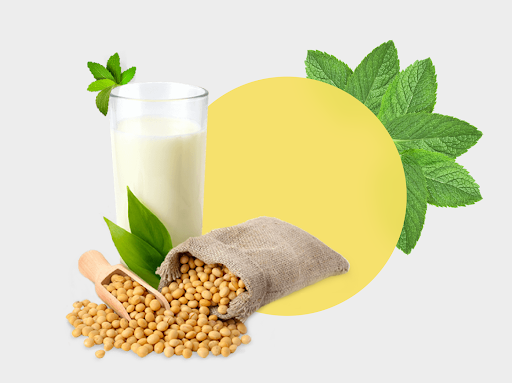Type 2 diabetes is a common condition arising due to insulin insufficiency or the body’s inability to utilize insulin, resulting in high blood glucose levels.
Soy milk is a plant/legume-based health drink prepared from soybeans.
A study reports that soy milk benefits diabetics greatly as it is rich in isoflavones (bioactive compounds), which potentially lowers blood sugar levels and the risk of heart ailments.
Furthermore, it is a calcium and fiber rich dairy-free diet.
But is soy milk better than dairy for diabetics?
How? Let’s explore, is soy milk good for diabetes?
Soy Milk: Nutritional Profile
This nutrition-rich milk is rich in isoflavones, fibers, proteins, omega-3 fatty acids, iron, calcium, zinc, magnesium, potassium, sodium, vitamins (vitamin B6), and various other micronutrients. Unlike dairy milk containing lactose as a natural sugar (carbohydrate), soy milk is the best unsweetened health beverage for diabetics. Moreover, it contains only 2% fat with zero harmful trans fat. Its low glycemic index of 30 makes it a diet of choice for patients with high blood sugar.
Advantages of Soy Milk for Diabetes
Being a fiber-rich source, soy milk has the potential to maintain a steady blood glucose level by slowing down the conversion of starch into glucose. The presence of isoflavones in it makes it a super antioxidant to remove the damaging free radicals. It is a rich source of minerals such as calcium and potassium, thus strengthening bone/teeth. Moreover, it helps control blood sugar and prevent heart diseases. Because it is an unsweetened drink, diabetics can consume it regularly.
Ways to Consume Soy Milk for Diabetes
It can be consumed as a low-calorie sugarless beverage. You can prepare low-calorie smoothies, soups, oatmeal, or chicken curry for intermittent meals or as breakfast delicacies. Moreover, you can make coffee, protein shake, and fruit shakes using soy milk.
Best Time to Consume Soy Milk for Diabetes
You can consume soy-based milk anytime in the day. Still, it is best to consume it in the morning hours for optimum digestion and absorption. This is because it is a protein-rich diet, and proteins are easy to digest in the morning when digestive juice secretion is the highest. Moreover, one can replace it with pre-workout protein shakes.
Risks of Overconsumption of Soy Milk
High nutritional value of soya milk keeps you healthy unless consumed in excess. It may cause nausea, bloating, and constipation. It contains phytic acid that may limit the natural absorption of iron, zinc, and magnesium on excess consumption. An itchy throat, breathing difficulty, and long-lasting inflammations can occur with its unwise usage. This usually occurs in those allergic to legume-based foods.
Other Health Benefits of Soy Milk
One can consume it to lower blood cholesterol and high blood pressure levels. It also promotes kidney function and manages lactose intolerance. Consuming soy milk helps in muscle strengthening and preventing osteoporosis. Furthermore, it helps in lowering symptoms of menopause and premenstrual syndrome. This is because of the presence of agents that mimic the effects of estrogen.
Don’t Have Time To Read?
- Soy milk is a plant/legume-based health drink rich in calcium and fibers.
- It helps maintain steady blood glucose levels by slowing down the conversion of starch into glucose.
- One can consume it for bone/teeth strengthening.
- You can make low-calorie coffee, protein shake, and fruit shakes using soy milk.
- Soy is highly nutritional and healthy unless consumed in excess.
Managing diabetes doesn’t have to be hard when you have the right information. These blogs cover everything you need to know—from understanding symptoms to tips on healthy eating and managing your condition. Explore these articles to stay informed and take control of your diabetes care!
| Curious About Diabetes-Friendly Foods? Discover What’s Good and What’s Not! |
| Is Milk Good For Diabetes |
| Is Paneer Good For Diabetes |
| Is Curd Good For Diabetes |
| Can Diabetics Drink Milk At Night |
| Buttermilk Benefits |
| Is Coconut Milk Good For Diabetes?? |
| Is Almond Milk Good For Diabetics? |
| Is Oat Milk Good For Diabetics?? |
Common FAQs
Is Soy Milk Good for Diabetes? Is Soy Milk Good for a Type 2 diabetic?
Yes, low glycemic index of soy milk (30) makes it a superb diet for such patients. This is because it contains zero natural sugar or carbohydrates. Moreover, the fiber present in this slows down the conversion of big sugar chains into glucose, maintaining steady blood glucose levels.
Does Soy Raise Blood Sugar? Does Soy Milk Increase Insulin?
No. Soy does not raise blood sugar. Instead, it helps in lowering it. As per studies, soy milk does not increase insulin levels but can help in improving insulin sensitivity. It is because of the isoflavones present in it.
What is the best milk for diabetics?
Undoubtedly, soy milk is even better than dairy milk for diabetics. This is because it lacks sugars or carbohydrates and has a very low glycemic index. Therefore, it is a zero sugar milk source for diabetics and is suitable for those intolerant to lactose.
What milk has no sugar?
Apart from unsweetened soy milk, almond milk, and coconut milk are kinds of milk having no natural sugar. So, all of them with different nutritional values are suitable for diabetics.

1 comment
[…] Also Read: Is Soy Milk Good for Diabetes […]